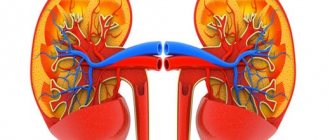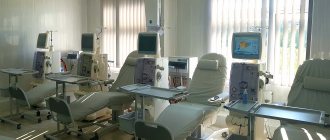Kidney failure: causes of development
Kidney failure can be caused by many factors that are simply impossible to exclude from the life of a modern person. The appearance of chronic renal failure is primarily caused by such unpleasant ailments as chronic pyelonephritis and especially chronic glomerulonephritis. Also, renal failure often occurs against the background of gout, diabetes, amyloidosis, lupus erythematosus and many other systemic diseases and rheumatic processes:
- urolithiasis,
- tumors of the urinary system,
- scleroderma,
- hydronephrosis,
- hemorrhagic vasculitis.
The development of chronic renal failure is also caused by congenital kidney abnormalities and vascular diseases that provoke disturbances in the renal blood flow.
Symptoms of chronic renal failure
Despite the high compensatory abilities of the kidneys (even 10% of the remaining functional nephrons can maintain a relatively normal water-electrolyte balance in the body), already in the first stages of chronic renal failure the electrolyte composition of the blood is disturbed, acidosis (acidification) develops, protein metabolism in the body is disrupted and metabolic products accumulate: creatinine, urea, uric acid.
CRF is characterized by a progressive course and has four main stages of development:
- latent,
- compensated,
- intermittent,
- terminal.
Regardless of the cause of the disease, the clinical picture of chronic renal failure is the same. Symptoms increase with each stage of the disease. At the first stage of chronic renal failure, a person may not even be aware of the presence of a problem, since the pathology manifests itself with not very specific complaints - insomnia, decreased appetite, and fatigue. Usually, such symptoms are simply ignored and attributed to simple fatigue after a day of work.
The compensated stage of renal failure brings an increase in symptoms, in addition, the picture is complemented by new symptoms:
- the death of part of the renal glomeruli causes the existing nephrons to work with overload, which provokes an increase in urine output to 2.5 l/day;
- At this stage, tests reveal protein in the urine and changes in the electrolyte composition of the blood.
The further development of chronic renal failure is characterized by an even greater decrease in the compensatory ability of the kidneys. Symptoms of intoxication increase, diuresis sharply decreases, the skin becomes dry, jaundiced, thins, muscle mass is lost, anemia, edema appears, a steady increase in blood pressure occurs, and shortness of breath.
If in the initial stages of chronic renal failure the pathological process can still be controlled with medication and with the help of a special diet, then the terminal stage of chronic renal failure is accompanied by irreversible changes in the kidney tissues and a drop in their filtration capacity to a minimum. In this case, patients require regular hemodialysis and, ideally, a kidney transplant.
Metastases
If a patient is diagnosed with stage 4 kidney cancer with metastases, then treatment will be quite complicated. A malignant neoplasm in the kidney can provoke the appearance of metastases in the lymph nodes or in other organs: in the lungs, brain, liver, as well as in the bones or another kidney.
The appearance of metastases in other organs may be indicated by shortness of breath, pain, nausea and other symptoms, depending on how the kidney cancer metastasizes - lymphogenous or hematogenous.
Diagnostics
If chronic renal failure is suspected, consultation with a nephrologist and a series of laboratory and instrumental studies are required. The most reliable are laboratory tests according to Zimnitsky, Reberg, general and biochemical blood and urine tests. To make a diagnosis of chronic renal failure, the basis is:
- decreased glomerular filtration level;
- high concentration of urea and creatinine;
- hyposthenuria - decreased urine density.
Ultrasound, CT or MRI of the kidneys reveals a decrease in their size and a pronounced decrease in the thickness of the parenchymal tissue, and echo Dopplerography of the renal vessels demonstrates a decrease in renal blood flow.
The powerful diagnostic base of the Clinic of Modern Medicine allows you to conduct a comprehensive examination for chronic renal failure and promptly obtain the results necessary to establish the correct diagnosis. The scope of necessary research is determined by the clinic’s specialists at the initial consultation.
Treatment of chronic renal failure
Modern nephrology has wide possibilities in the treatment of chronic renal failure. The use of innovative therapeutic techniques can fundamentally change the quality of treatment of chronic renal failure and significantly slow down the progression of the disease. For the treatment of chronic renal failure in the pre-dialysis stage, the doctors of our Clinic use the most advanced medication and physiotherapeutic techniques to slow down the development of the disease and minimize the severity of the manifestations of renal failure.
The nephrologist selects a therapeutic regimen in each clinical case strictly individually, depending on the stage of the disease, the main cause of the development of chronic renal failure, the clinical picture and its severity, the patient’s age and general state of health. Therapeutic measures are aimed at eliminating symptoms, compensating for uremia and normalizing hemostasis. Diet and drinking regimen play an important role in the treatment of chronic renal failure.
It should be remembered that conservative treatment shows good results only in the initial stages of chronic renal failure, when there are no irreversible changes in the kidneys. Therefore, it is so important for patients suffering from various diseases of the urinary system to be regularly examined by a nephrologist, because even minimal studies - blood and urine tests - provide enough information about the condition of the kidneys.
Our medical center provides the widest range of services. You can always contact us regarding the treatment of nephrological diseases. We are ready to provide you with ] treatment of chronic glomerulonephritis[/anchor] and treatment of chronic interstitial nephritis.
Treatment of chronic renal failure 2
Treatment of chronic renal failure 2
The use of certain treatment methods for chronic renal failure depends on the stage of renal failure. In case of latent renal failure, the main attention should be paid to the treatment of the disease - the etiological factor of chronic renal failure (see Table 1). Table 1. Treatment of the main etiological factors of chronic renal failure.
| Diseases | Main directions of treatment |
| Diabetic glomerulosclerosis | Insulin, hypoglycemic drugs for internal use |
| Hypertonic disease | Antihypertensive drugs |
| Chronic glomerulonephritis | Glucorticoids, converting enzyme inhibitors |
| Chronic pyelonephritis | Antibacterial agents |
| Amyloidosis | Melphalan |
| Obstructive uropathy | Surgical correction |
| Systemic lupus erythematosus | Glucocorticoids |
| Myeloma | Glucocorticoids, melphalan |
Vigorous etiotropic treatment in some cases gives a very good effect and kidney function improves. For glomerulopathies, the use of converting enzyme inhibitors - enalapril, ramipril - has a good effect. In patients with chronic pyelonephritis, it is necessary to carry out active antibiotic therapy, taking into account the effect of certain groups on renal function. In case of diabetes mellitus, one should strive for the most complete compensation of carbohydrate metabolism. Diet therapy has a direct impact on incipient azotemia, although this issue is to some extent controversial. A number of studies have shown that a low-protein diet actually reduces creatinine levels, but patients often do not follow dietary recommendations, especially if the amount of protein in the diet is less than 40 g/day. In this regard, it is recommended to prescribe a diet with a limited amount of protein in the range of 40-60 g/day. The diet is moderately limited in sodium and potassium. In the azotemic stage, with a persistent increase in creatinine and urea levels, but without obvious signs of uremia, treatment of the underlying disease should be continued, but taking into account the urinary clearance of the drugs used. If there is a tendency towards oliguria, the administration of diuretics, mainly saluretics, is periodically indicated. There is evidence of the effectiveness of enterosorbents in reducing azotemia. Enterodesus and polyphepan are used. Conservative treatment methods include measures aimed at correcting severe metabolic disorders characteristic of uremia and symptomatic therapy. The main therapeutic approaches are presented in the diagram. Overhydration. To calculate the administered fluid, it is useful to use the formula: daily diuresis + 500 ml, with increasing oliguria: daily diuresis + 300 ml. At the same time, diuretics are prescribed; the most effective is furosemide (Lasix) in fairly high doses (up to 100 mg/day parenterally) with constant monitoring of electrolyte levels. Other diuretics are not used. Anemia. Its development in chronic renal failure is based on a decrease in the kidneys' production of erythropoietin, a hormone that regulates erythropoiesis. To a lesser extent, anemia is caused by a decrease in iron reserves in the body. Anemia is an early manifestation of chronic renal failure. It appears in patients with glomerulonephritis when the glomerular filtration rate (GFR) decreases to 50 ml/min, and in patients with diabetic nephropathy even earlier - at a GFR level of 60-70 ml/min. Anemia persists in patients undergoing hemodialysis or peritoneal dialysis and disappears after kidney transplantation. For the treatment of anemia, erythropoietin preparations (epoetin, epogen, procrit) are most effective. For conservative treatment of chronic renal failure, they are prescribed in a dose of 30-60 units/kg 1 time per week intravenously or subcutaneously, for patients on hemodialysis 50-100 units/kg 3 times a week. Treatment is carried out until the target hemoglobin level is achieved, which is 13.5-14 g/dL for patients before dialysis and 11.5-12 g/dL for dialysis patients. Iron deficiency is eliminated with the help of iron preparations prescribed orally (ferrous sulfate or ferrous fumarate) or parenterally (ferlecit, venofer, dexferrum). Hypertension. Hypertension is one of the most important factors in the progression of chronic renal failure. To correct it, almost all groups of antihypertensive drugs are used - beta-blockers (propranolol, atenolol, labetolol), diuretics (furosemide), calcium antagonists (nifedipine, verpamil), converting enzyme inhibitors (captopril, enalapril, ramipril, lisinopril), tissue receptor blockers to angiotensin (losartan). A combination of drugs from different groups allows you to reduce the dose of each drug used. Combinations such as converting enzyme inhibitor + saluretic + beta blocker are recommended; calcium antagonist + beta blocker. Hyperkalemia. To treat this condition, intravenous administration of 100-200 ml of 40% glucose solution with 15-20 units is used. insulin, intravenous calcium chloride or calcium gluconate. At critical levels of hyperkalemia, hemodialysis helps, even short-term (for one day). Acid-base balance disorders. For acidosis, bicarbonate solutions and soda enemas are used intravenously. Alkalosis - ammonium chloride, and when alkalosis is combined with hypokalemia - ammonium chloride along with potassium chloride. In the uremic stage of chronic renal failure, the issue of prescribing one of the types of active, replacement therapy should be decided. Conventionally, active therapy methods include the use of a low-protein diet with a protein content of 18-20 g/day. This method is used if there are no conditions for using more effective methods, mainly due to technical and economic reasons. The diet proposed by Giordano and Giovanetti is based on the fact that in conditions of protein deficiency, but with a sufficiently high caloric content of food, it is possible to reutilize urea nitrogen and other nitrogenous metabolic products formed in the body. In fact, the patient receives only egg whites, vegetable proteins are excluded as much as possible, and special protein-free varieties of bread and biscuits are used. Subjectively, patients do not tolerate such a diet well; great will and patience are required from them and their attending physicians. Truly active methods of treating chronic renal failure are program dialysis using an artificial kidney machine, peritoneal dialysis, and kidney transplantation. Program dialysis. It is carried out by connecting an arteriovenous fistula to an artificial kidney apparatus. Nitrogenous wastes and electrolytes diffuse through a synthetic semi-permeable membrane, and water is removed by hydrostatic pressure from the blood (ultrafiltration). Hemodialysis is carried out 2 - 3 times a week. Indications for starting hemodialysis are an increase in serum creatinine levels above 0.9 - 1.0 mmol/l and a decrease in GFR less than 10 ml/min. Less strict indications for earlier initiation of hemodialysis are given to patients of senile and childhood age, severe diabetes, coronary artery disease, uncontrolled hypertension, chronic infections, uremic polyneuropathy, hyperhydration, hyperkalemia, and decompensated metabolic acidosis. Peritoneal dialysis. It is carried out by introducing a dialysate solution into the abdominal cavity through a chronic peritoneal catheter. The role of a semi-permeable membrane that removes nitrogenous wastes and electrolytes is performed by the peritoneal mesothelium. Water removal occurs under the influence of an osmotic pressure gradient due to the use of solutions with high glucose concentrations. The indications for this type of dialysis are approximately the same as for hemodialysis. There may be continuous and intermittent modes of procedures. Kidney transplantation. It should be performed in patients with chronic renal failure without irreversible complications of this syndrome. The compatibility of the donor and recipient is determined by blood groups and histocompatibility antigens. After transplantation, immunosuppressive therapy with cyclosporine A and glucocorticoids is carried out. Literature.
- V.M. Ermolenko. Chronic renal failure.
- Mauro Verreli. Chronic Renal Failure.
- A.Yu.Nikolaev, L.V.Kozlovskaya. Erythropoietin: use in the early and dialysis stages of chronic renal failure.
- A.Yu. Nikolaev, N.L. Lifshits, Yu.S. Milovanov. Diagnosis and principles of treatment of chronic renal failure.
01/07/2021 11:15:17 am
Med-Apparatus
Med-Apparatus
Med-Apparatus medical devices and physiotherapy. Medical equipment bulletin board.
Russia
Med-Apparatus medical devices and physiotherapy. Medical equipment bulletin board.








